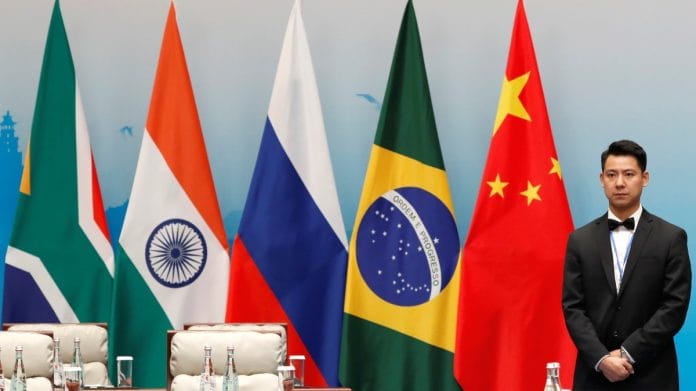New Delhi: India has given its stamp of approval to a joint statement by BRICS foreign ministers that is critical of Israel’s actions in Gaza and its “disregard of international law”.
The Ministry of External Affairs (MEA) has so far not used terms such as “occupied Palestinian territory” and “Israel’s blatant disregard of international law” in its statements about the war, as it has tried to maintain a delicate balancing act between Israel and Palestine since last October.
When the war first broke out, Narendra Modi — the first ever Indian PM to visit Israel — condemned the 7 October attack by Hamas and expressed solidarity with Israel. It set India apart from reactions in the ‘Global South’, and hewed closer to the position of the US and other G7 countries at the time. Five days later, the MEA clarified that New Delhi maintains its “long-standing” position on the need for a two-state solution.
Over the course of the war, India has abstained from key resolutions in the United Nations (UN) calling for an immediate ceasefire in Gaza, but backed Palestine’s bid for membership at the UN last month. New Delhi has provided 70 tons of humanitarian aid to Palestine while also facing pressure from Israel to designate Hamas as a terror group.
BRICS is a group of developing countries that comprises Brazil, Russia, India, China, South Africa and others.
‘Occupied Palestinian Territory’
“The Ministers expressed grave concern at the deterioration of the situation in the Occupied Palestinian Territory,” states paragraph 34 of the BRICS foreign ministers’ statement issued in Novgorod, Russia on Monday.
Rajiv Bhatia, former Indian ambassador to South Africa, told ThePrint: “The BRICS foreign ministers have used unusually harsh language to censure Israeli actions. A key factor responsible for this noticeable development is the entry of Arab nations (Saudi Arabia, Iran and UAE), and two African nations (Egypt and Ethiopia) into the grouping.”
Notably, this was the first high-level BRICS meet since the entry of the three Middle Eastern nations. Foreign ministers from all three countries attended the meeting, including Iran’s Acting Minister of Foreign Affairs Ali Bagheri, who replaced the late Hossein Amir-Abdollahian.
India was represented by Dammu Ravi, secretary (economic relations) as External Affairs Minister S. Jaishankar only formally took charge Tuesday morning. China’s Wang Yi and Russia’s Sergey Lavrov were also present.
Last November, Iran’s then foreign minister wrote to foreign ministers from BRICS countries, urging their intervention in the “dire” Gaza situation. He had also written to Shanghai Cooperation Organisation (SCO) head Zhang Ming with the same demand.
Palestine envoy welcomes BRICS statement
The foreign ministers’ joint statement also “condemned the Israeli military operation in Rafah”. It expressed concern over the “high density of Palestinian civilians in this location, and the humanitarian catastrophic results due to the suspension of the Rafah crossing from the Palestinian side”.
The statement, though briefly, also called for the release of Israeli hostages.
Speaking to ThePrint, Adnan Abu Al Haija, the Palestinian ambassador to India, said: “We welcome the statement and thank India and all parties of BRICS. We are still looking for more pressure on Israel to think of peace, stop their crimes and to accept the two-state solution”.
Meanwhile, Israeli embassy spokesperson Guy Nir told ThePrint: “We welcome the comment of the immediate and unconditional release of the hostages”.
There was also a mention of South Africa’s case against Israel at the International Court of Justice (ICJ) in the BRICS statement. “They (foreign ministers) acknowledged the provisional measures of the International Court of Justice in the legal proceedings instituted by South Africa against Israel. The Ministers expressed serious concern at Israel’s continued blatant disregard of international law, the UN Charter, UN resolutions and Court orders,” the statement read.
After South Africa levelled allegations of genocide against Israel at the UN’s top court last December, over a dozen countries, including Spain, Colombia and Turkey, expressed their support for the case. Israel, however, has repeatedly rejected the charge.
In May, days before an Israeli air strike triggered a massive fire in a camp in Rafah, the ICJ issued a dramatic ruling in which it ordered Israel to stop its military offensive — an emergency measure that was part of a larger case brought by South Africa. Israel rejected the ruling.
“The invocation of the ICJ was likely inevitable, where South Africa spearheads the accusations levelled against Israel,” explained Israeli analyst and journalist Lev Aran.
He added: “Both South Africa and India are entering into the dharma of coalition; however, from Israel’s perspective, the electoral defeat of the ruling party in South Africa is welcomed news, and in the case of India, Israel hopes that India will serve as a voice of moderation in every forum of the Global South.”
(Edited by Tikli Basu)







Gr8. It’s important to notice the difference between the joint statement in a grouping & India’s own foreign policy stance. It tells a lot about India’s influence in the group. I think earlier this year in the NAM meet in Kampala, Dr. Jaishankar was one of the few foreign ministers who mentioned terrorism in the statement issued by India while the joint statement unequivocally condemned Israel